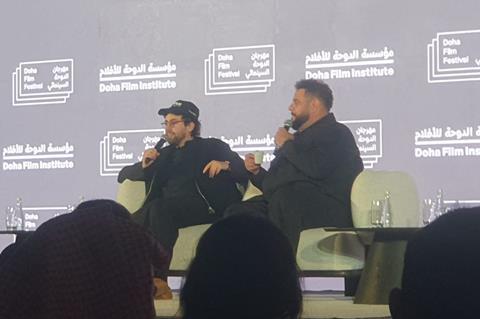
US actor-writer Ramy Youssef and Palestinian-American actor-writer Mo Amer discussed the sensitivities they encounter around topics including sex and religion, and how those intersect with their identities, including as Arab creators.
On a panel at the Doha Film Festival (DFF) this week titled ‘The Stories We Tell Ourselves’, the duo were asked by host, journalist Ayman Mohyeldin, if they felt a burden to try not to upset one group over another when creating art.
“I did for a second, then I realised it was going to be hard to keep thinking things if I felt too connected to what people are going to think,” said Youssef, who is of Egyptian descent. He won a Golden Globe for Hulu series Ramy in 2020 and starred in Yorgos Lanthimos’s Poor Things last year.
“There’s always this flux going on,” he continued. “People who aren’t political are upset you’re talking about politics. People who are very religious are upset you’re talking about sex. People who don’t care about religion are like, ‘Why are you praying so much on your show?’
“It’s really funny,” he continued. “Everyone sees the sensitivity they want. The people who are like ‘there are so many sex scenes!’… actually, there are more prayer scenes!
“Our job as artists is to figure out where we’re just going to let the art deal with it. You don’t do something to bother people overtly. You do it because you care about it, and you think there’s a reason for it. The rest is truly with Allah.”
“Each story is going to be different from another,” said Amer. “You’re not really thinking about people’s sensitivities, you’re thinking about, ‘Does this feel good? Is this correct? Does this do justice to the entire arc of what you’re trying to do?’
“You’re never going to make everybody happy. It’s an impossibility. But I also think there is a responsibility. Arab characters in Hollywood for the last 100 years have been depicted in a certain way.”
Perceptions
“We need to be aggressive in the way we tell stories,” suggested Amer, citing Sut Jhally’s 2006 documentary Reel Bad Arabs as reference. “The way we shift that [the current perception of Arab people] is putting fuel on the fire. All these phenomenal creatives are here, people who have great stories and the ability to do it. We have to do as much as possible to counteract everything that’s happened in the last 100 years, of how we’ve been projected on television in the West.”
Echoing the words of Iranian-French actress Golshifteh Farahani at the DFF opening ceremony, Amer called for greater unity between creators from Arab regions. “Whether it be as artists, entrepreneurs, it’s really important to be united,” he said to applause from the public audience. “We’re very competitive, and it seems like sometimes we step on each other’s toes rather than being unified as Arab nations.”
Youssef expressed his excitement at the busy few days of industry activity in Qatar. “What excites me about the region is there are going to be things made here that totally shift the paradigm,” he said. “The burden of explanation doesn’t exist in the same way that it does when we’re making things in America.
“The tax incentive [a new cash rebate of up to 50% in Qatar] is incredible,” said Youssef, then turning to speak to aspiring creators. “With everything that’s happening here this weekend, just be ready. Eliminate the ‘can I?’ and just do it. Because it’s just going to happen. The guardrails are gone.”
Amer did caution against rushing into creative endeavours. “In this day and age with socials [social media], everybody wants everything really quick – and that’s a problem, because you’re not nurturing your talent, whether it be writing skills, stand-up, filmmaking, acting,” said Amer. “And you want everything to come tomorrow. Fast rise, fast fall. It’s very important to listen, digest information, process what your elders in the game are telling you, because they want the best for you. It might be hard to sit there and wait but in the end it’s going to be the best thing.”
Doha Film Festival runs until Friday, November 28.

























No comments yet